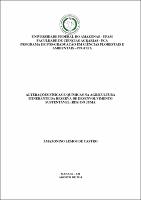| ???jsp.display-item.social.title??? |


|
Please use this identifier to cite or link to this item:
https://tede.ufam.edu.br/handle/tede/6071| ???metadata.dc.type???: | Dissertação |
| Title: | Alterações físicas e químicas na agricultura itinerante da Reserva de Desenvolvimento Sustentável (RDS) do Juma |
| ???metadata.dc.creator???: | Castro, Amazonino Lemos de  |
| ???metadata.dc.contributor.advisor1???: | Tucci, Carlos Alberto Franco |
| First advisor-co: | Neves Junior, Afrânio Ferreira |
| ???metadata.dc.description.resumo???: | A grande maioria dos estabelecimentos de agricultura familiar da região Amazônica fazem uso da Agricultura Itinerante (AI), que é basicamente a utilização de uma área, manejada com corte e queima da biomassa, por um período de um ou dois anos, seguidos de vários anos de pousio. As comunidades inseridas no perímetro da RDS do Juma fazem dessas técnicas, tendo em vista que que a forma de produção dos ribeirinhos que povoam as Unidade de conservação (UC) do Estado do Amazonas é importante para a conservação destas, evitar o crescimento das áreas desflorestadas já utilizadas para a agricultura e aumentar a produtividade agrícola dessa população é um verdadeiro desafio, tendo em vista o decréscimo da produção desses produtores em razão do manejo aplicado. Tende em vista essa problemática, o presente estudo teve como objetivo estudar as alterações do solo em função da Agricultura Itinerante na RDS do Juma localizada no município de Novo Aripuanã-AM. Realizou-se coleta em quatro áreas, sendo que a floresta natural foi utilizada como testemunha e áreas com dois, seis e dez anos de pousio e foram realizadas análises físicas e químicas do solo. Como principais resultados, o referido estudo mostrou que a agricultura itinerante não causou degradação física do solo, pois os atributos físicos mostraram-se dentro da faixa considerada ideal. No entanto, afetou negativamente a qualidade química, evidenciada pela baixa disponibilidade de nutrientes. Os vários ciclos de cultivo sem a reposição dos nutrientes juntamente com a utilização do fogo no manejo do solo, causaram a depleção dos atributos químicos, sendo este um fator determinante para a abertura de novas áreas. |
| Abstract: | The vast majority of family farming establishments in the Amazon region make use of the Itinerant Agriculture (IA), which is basically the use of an area, managed to cutting and burning of biomass, for a period of one or two years, followed by several years fallow. The communities included in the perimeter SDR of Juma make these techniques, considering that the form of production of riparian that populate the conservation Unit (CU) of the State of Amazonas is important for the conservation of these, prevent the growth of deforested areas already used for agriculture and increase agricultural productivity of this population is a real challenge, given the decline in production of these producers due to the applied management. Bear in mind this problem, this study aimed to study changes in soil due to the Itinerant Agriculture in the Juma Reserve located in the Novo Aripuanã-AM municipality. Collection was carried out in four areas, and the natural forest was used as a control and with two areas, six and ten years of fallow and physical and chemical analyzes were made of the soil. As main results, the study showed that shifting cultivation did not cause physical degradation, since the physical attributes were within the healthy range. However, adversely affect the chemical quality, evidenced by low nutrient availability. The various cycles of cultivation without replenishing the nutrients along with the use of fire in land management, caused the depletion of the chemical, which is a determining factor for the opening of new areas. |
| Keywords: | Agricultura Itinerante Degradação Física e Química RDS do Juma |
| ???metadata.dc.subject.cnpq???: | CIÊNCIAS AGRÁRIAS: RECURSOS FLORESTAIS E ENGENHARIA FLORESTAL |
| Language: | por |
| ???metadata.dc.publisher.country???: | Brasil |
| Publisher: | Universidade Federal do Amazonas |
| ???metadata.dc.publisher.initials???: | UFAM |
| ???metadata.dc.publisher.department???: | Faculdade de Ciências Agrárias |
| ???metadata.dc.publisher.program???: | Programa de Pós-graduação em Ciências Florestais e Ambientais |
| Citation: | CASTRO, Amazonino Lemos de. Alterações físicas e químicas na agricultura itinerante da Reserva de Desenvolvimento Sustentável (RDS) do Juma. 2014. 58 f. Dissertação (Mestrado em Ciências Florestais e Ambientais) - Universidade Federal do Amazonas, Manaus, 2014. |
| ???metadata.dc.rights???: | Acesso Aberto |
| ???metadata.dc.rights.uri???: | http://creativecommons.org/licenses/by-nc-nd/4.0/ |
| URI: | http://tede.ufam.edu.br/handle/tede/6071 |
| Issue Date: | 21-Aug-2014 |
| Appears in Collections: | Mestrado em Ciências Florestais e Ambientais |
Files in This Item:
| File | Description | Size | Format | |
|---|---|---|---|---|
| Dissertação - Amazonino Castro.pdf | 2.6 MB | Adobe PDF |  Download/Open Preview |
This item is licensed under a Creative Commons License





